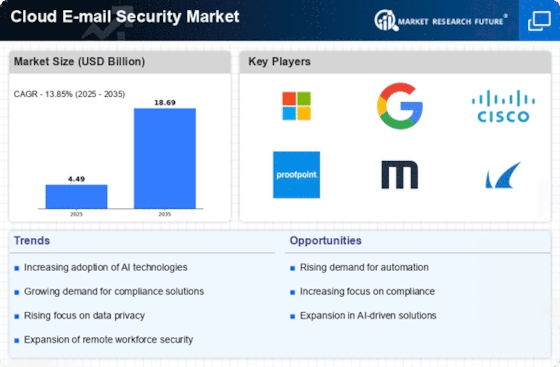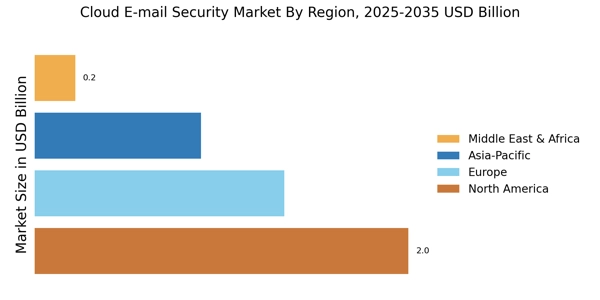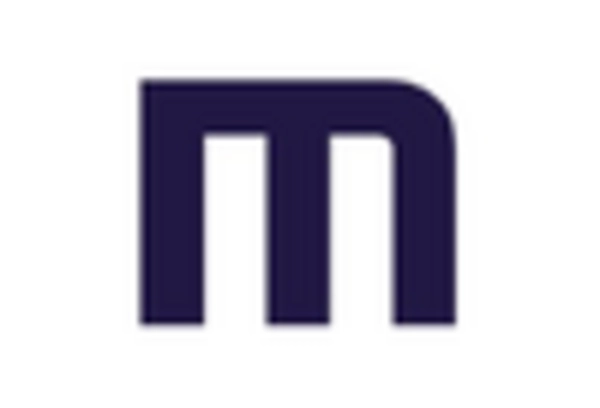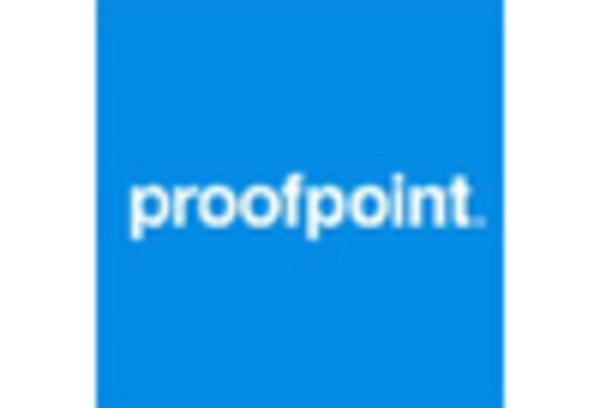Growing Remote Workforce
The shift towards remote work has significantly influenced the Cloud E-mail Security Market. With an increasing number of employees working from home, organizations are compelled to enhance their email security measures to protect against vulnerabilities associated with remote access. Data indicates that remote work has led to a 30% increase in email-related security incidents. Consequently, businesses are investing in cloud-based email security solutions that offer flexibility and scalability. This trend highlights the necessity for organizations to adapt their security strategies to accommodate a dispersed workforce, thereby propelling the Cloud E-mail Security Market forward.
Rising Cybersecurity Threats
The Cloud E-mail Security Market is experiencing heightened demand due to the increasing frequency and sophistication of cyber threats. Organizations are facing a surge in phishing attacks, ransomware, and other malicious activities targeting email systems. According to recent data, nearly 90% of cyberattacks begin with email, underscoring the critical need for robust email security solutions. As businesses recognize the potential financial and reputational damage from data breaches, investments in cloud email security are likely to escalate. This trend suggests that companies are prioritizing the protection of sensitive information, thereby driving growth in the Cloud E-mail Security Market.
Regulatory Compliance Requirements
The Cloud E-mail Security Market is also being driven by stringent regulatory compliance requirements. Organizations are mandated to adhere to various data protection regulations, such as GDPR and HIPAA, which necessitate the implementation of robust email security measures. Failure to comply with these regulations can result in substantial fines and legal repercussions. As a result, businesses are increasingly seeking cloud email security solutions that not only protect sensitive data but also ensure compliance with regulatory standards. This growing emphasis on compliance is likely to fuel the demand for advanced email security technologies within the Cloud E-mail Security Market.
Increased Awareness of Data Privacy
There is a growing awareness of data privacy among consumers and businesses alike, which is significantly impacting the Cloud E-mail Security Market. As individuals become more conscious of how their data is handled, organizations are compelled to adopt stringent email security measures to protect personal information. This heightened awareness is driving companies to invest in cloud email security solutions that ensure data integrity and confidentiality. Furthermore, as public sentiment increasingly favors transparency and accountability, businesses that prioritize email security are likely to gain a competitive edge. This trend suggests a robust future for the Cloud E-mail Security Market as organizations strive to meet evolving consumer expectations.
Integration of Advanced Technologies
The integration of advanced technologies, such as artificial intelligence and machine learning, is transforming the Cloud E-mail Security Market. These technologies enhance the ability to detect and respond to threats in real-time, thereby improving overall security posture. AI-driven solutions can analyze vast amounts of data to identify patterns and anomalies, which may indicate potential security breaches. As organizations seek to leverage these technologies to bolster their email security frameworks, the demand for innovative cloud email security solutions is expected to rise. This trend indicates a shift towards more proactive and intelligent security measures within the Cloud E-mail Security Market.

















